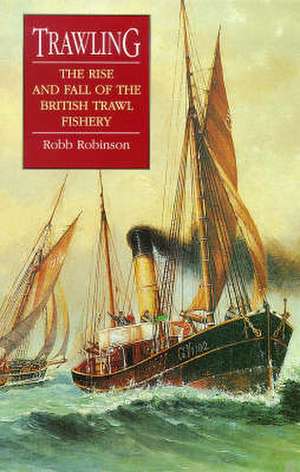Trawling: The Rise and Fall of the British Trawl Fishery: Exeter Maritime Studies
Autor Robb Robinsonen Limba Engleză Paperback – 1996
Preț: 392.99 lei
Nou
Puncte Express: 589
Preț estimativ în valută:
75.21€ • 77.92$ • 62.77£
75.21€ • 77.92$ • 62.77£
Carte tipărită la comandă
Livrare economică 22 martie-05 aprilie
Preluare comenzi: 021 569.72.76
Specificații
ISBN-13: 9780859896283
ISBN-10: 0859896285
Pagini: 280
Ilustrații: illustrations, bibliography, index
Dimensiuni: 229 x 147 x 23 mm
Greutate: 0.45 kg
Ediția:Revised
Editura: Liverpool University Press
Colecția Liverpool University Press
Seria Exeter Maritime Studies
Locul publicării:United Kingdom
ISBN-10: 0859896285
Pagini: 280
Ilustrații: illustrations, bibliography, index
Dimensiuni: 229 x 147 x 23 mm
Greutate: 0.45 kg
Ediția:Revised
Editura: Liverpool University Press
Colecția Liverpool University Press
Seria Exeter Maritime Studies
Locul publicării:United Kingdom
Cuprins
Introduction
Chapter 1 The Pre-Trawling Era
Chapter 1 The Pre-Trawling Era
Chapter 2 The Pioneers
Chapter 3 Railways and Markets
Chapter 4 Opening up the North Sea
Chapter 5 Free Trade and Indentured Labour
Chapter 6 Fishermen and Fleeting
Chapter 7 The Coming of the Steam Trawler
Chapter 8 Beyond the North Sea
Chapter 9 Steam and Storm
Chapter 10 The Great War
Chapter 11 Distant-Water Dominance
Chapter 12 Inter-War Life and Labour
Chapter 13 The Second World War
Chapter 14 The Cost of Trawling
Chapter 15 Freezers and Factory Fleets
Chapter 16 Cod Wars and Common Fishery Policies: The Beginning of the End
Epilogue
Notes, Bibliography, Index
Recenzii
“Trawling makes a particularly strong mark simply in the way it conveys to the reader the everyday working lives of British trawl fishermen. We also gain valuable insight into the maritime trades that supported trawling. The objective, yet humanly transecendent, tone with which Robinson evokes the rigours and danger of trawling in ever more distant waters has seldom been matched by maritime historians dealing with this labour issue. There is a level of ethnographic authority in Robinson's narrative (possibly due to his family's longtime involvement in the industry) that soundly situates the reader in the trawlerman's distinct culture, from the benefits that accrued to being affiliated with a succesful skipper to the struggles to achieve unionization among commercial fishing's rank-and-file.
“One can feel the rhythms of the fisherman's community in Robinson's commentary - time spent not only at sea, but in the home, in the pub, and on the docks. Indeed, Trawling is one of the few treatments of this maritime industry that acknowledges the significant role women played in a setting where men were frequently gone. Trawling further contributes to fisheries history by discussing the unique role trawlermen played as small-boat handlers in the Trawler Section of Royal Naval Reserve during World War I; the Royal Naval Patrol Section during World War II; and as ever-present lifesavers during peacetime. As can be inferred from Robinson's title, trawling's symbolism and tangible effect will resonate economically and environmentally for years to come. To this end, Trawling is commendable for its methodological, interpretive, and substantive contributions to the international community of maritime historians.” –International Journal of Maritime History, 1999
“One can feel the rhythms of the fisherman's community in Robinson's commentary - time spent not only at sea, but in the home, in the pub, and on the docks. Indeed, Trawling is one of the few treatments of this maritime industry that acknowledges the significant role women played in a setting where men were frequently gone. Trawling further contributes to fisheries history by discussing the unique role trawlermen played as small-boat handlers in the Trawler Section of Royal Naval Reserve during World War I; the Royal Naval Patrol Section during World War II; and as ever-present lifesavers during peacetime. As can be inferred from Robinson's title, trawling's symbolism and tangible effect will resonate economically and environmentally for years to come. To this end, Trawling is commendable for its methodological, interpretive, and substantive contributions to the international community of maritime historians.” –International Journal of Maritime History, 1999








